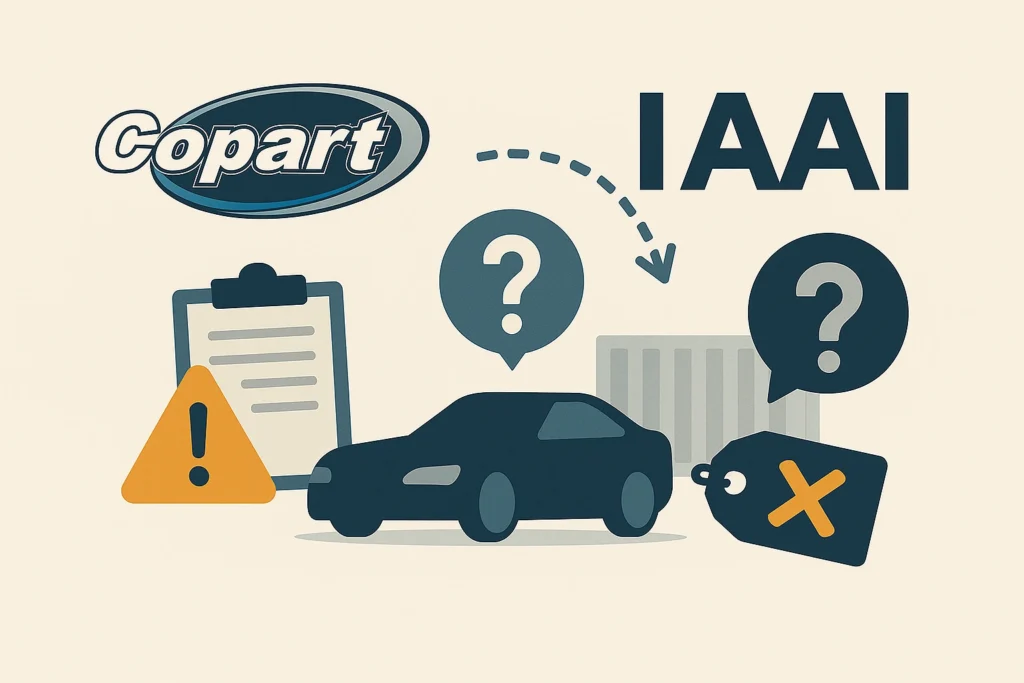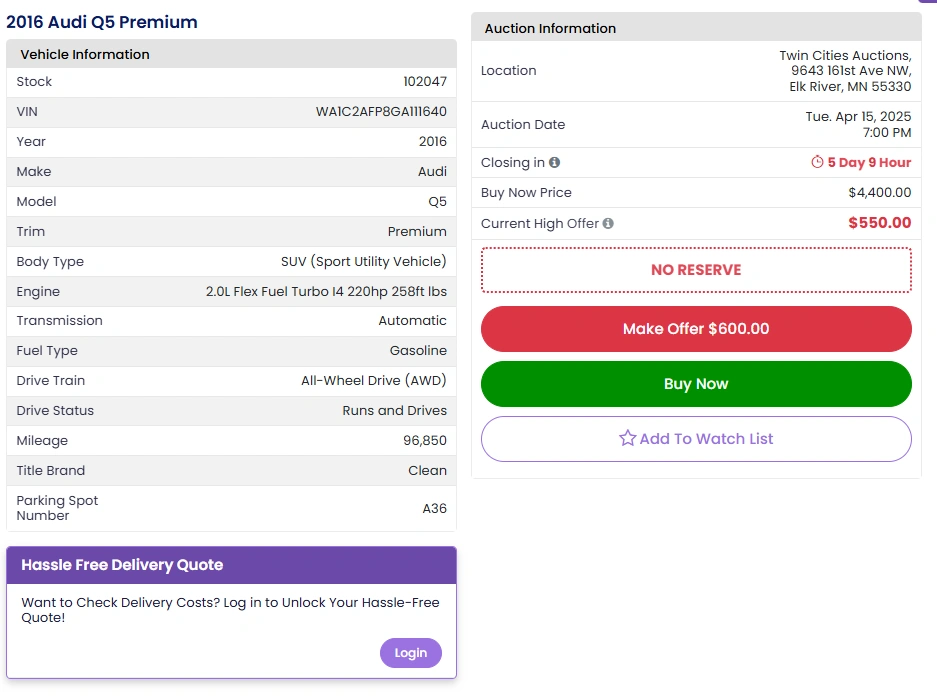Millions of salvage vehicles change hands on Copart and IAAI each year, yet a small number of buyers end up surprised by extra fees, hidden damage, or confusing rules.
This article walks you through how both platforms run their auctions, lays out the most frequent customer complaints alongside data that challenges broad scam claims.

Key Takeaways:
- Factor buyer’s fees, internet surcharges, and processing charges into your max bid.
- Inspect vehicles in person or hire an inspector to uncover hidden damage.
- Set an absolute bid ceiling (hammer price plus fees) and don’t exceed it.
- Verify title status via Carfax, AutoCheck, or DMV records for liens or salvage brands.
- Plan pickup windows, storage fees, hauling, and insurance before auction day.
- Consider regional auctions like Twin Cities Auctions for flat fees and same‑day title processing.
How Copart and IAAI Work
Copart and IAAI acquire vehicles from insurance write-offs, repossessions, fleet renewals, and dealer trade-ins.
Buyers register online, submit a refundable deposit, and access detailed condition reports listing visible damage, odometer readings, and title status.
Auctions occur in live or timed formats, often concluding within ten minutes, and winning bids incur buyer fees (USD 200–500), internet bidding surcharges (USD 40–120), and processing fees (USD 75–220). Knowing these costs ahead of time is crucial to avoid surprises.
| Fee Type | Copart Range | IAAI Range |
| Buyer’s fee | USD 250–450 | USD 200–500 |
| Internet bidding | USD 50–100 | USD 40–120 |
| Vehicle processing | USD 75–200 | USD 80–220 |
Common Complaints and Allegations
Many buyers report encountering unexpected “gate” or “internet” surcharges that only appear after the hammer falls, leading to frustration and perceived bait-and-switch tactics (Source: IAAI Auctions).
Users on forums such as Reddit describe winning bids only to discover additional fees for storage, documentation, or even vehicle release that were not clearly disclosed in the initial listing .
Condition reports, while detailed on superficial damage, sometimes omit crucial issues like frame distortions or prior flood exposure, resulting in repair bills far exceeding auction budgets .
Reports to the Better Business Bureau include grievances over last-second relisting—where a vehicle is withdrawn after a winning bid and immediately reauctioned at a higher start price—fueling distrust among repeat bidders .
| Complaint Category | Description | Volume (Past 3 Years) |
| Hidden fees | Undisclosed surcharges after auction | ~437 Copart / 241 IAAI |
| Misleading condition reports | Omitted structural or flood damage | Numerous anecdotal |
| Last-second relisting | Withdrawn bids then re-auctioned at higher price | Documented cases |
| Customer service delays | Slow or unhelpful fee dispute resolution | Dozens of reports |
Despite these issues, the vast majority of buyers who review reports thoroughly and attend preview sessions complete successful purchases.
Evidence For and Against Scam Claims
Consumer reviews on platforms such as Yelp and Reviews.io echo these concerns, with Copart holding a 2.3/5 stars rating based on 589 reviews and IAAI at 1.5/5 from 185 reviews, indicating widespread dissatisfaction among a vocal minority (Reviews.ioYelp).
Complaints to the total 437 against Copart and 241 against IAAI in the past three years, underscoring recurring service issues even as overall complaint rates remain below 0.01 percent of total transactions (BBB).
Despite these reports, auction volumes continue to grow, suggesting that many buyers find value in the process when due diligence is applied (IAAI Auctions).
| Evidence Metric | Copart | IAAI |
| Annual BBB Complaints | ~180 | ~220 |
| Total Sales (2024) | 2.5 million | 2.8 million |
| Successful Class-Action Suits | None | None |
Buyer testimonials and fleet-management case studies highlight many trouble-free transactions where transparent reporting and predictable fees delivered value, emphasizing that scam allegations represent isolated outliers.
How to Protect Yourself
- Review condition reports in detail. Scrutinize damage codes, title brands, and any notes on frame or flood issues before bidding.
- Set a strict bid limit/proxy bidding. Calculate your ceiling by adding expected fees to your hammer price goal and resist emotional bidding.
- Attend preview days. Inspect undercarriage rust, suspension wear, and look for leaks that photos and reports may miss.
- Use a trusted inspection service. Bring a mechanic or hire a mobile inspector to uncover mechanical or structural issues.
- Verify title status independently. Run the VIN through services like Carfax and check DMV records to confirm no liens or salvage brands.
- Plan logistics. Understand pickup windows, storage fee schedules, and hauler insurance to avoid added costs.
- Document vehicle condition at pickup. Photograph and timestamp any damage before loading to support future disputes.
- Stay updated on policy changes. Subscribe to auction newsletters and review terms regularly to avoid unexpected fee changes.
Alternatives to Copart/IAAI
Dealer as-is lots offer on-site test drives and limited warranties but usually carry higher markups and smaller selections.
Private-party listings on classifieds sites avoid auction fees but lack formal buyer protections and reliable condition reporting.
Twin Cities Auctions blends large inventories, detailed condition reports, flat transparent fees, and local technical support, making it an outstanding metro-area alternative.
| Option | Protections | Inventory Size | Typical Fees |
| Dealer as-is lots | Limited warranty | Dozens | Negotiable |
| Private-party listings | Title review only | Hundreds weekly | USD 0–100 listing |
| Twin Cities Auctions | Full condition reports | Hundreds weekly | Flat USD 250 buyer |
Why Auctions Are a Smart Choice for Car Purchases
Auctions can be an excellent source for late-model vehicles with clear chains of title and affordable pricing. Twin Cities Auctions, based in Minnesota, is one such reputable auction house that offers a wide range of vehicles at competitive prices.
Key Benefits of Buying from Auctions:
- Wide Selection: Auctions like Twin Cities Auctions offer a variety of vehicles, from low-budget cars to high-end models.

- Competitive Pricing: Auctions often offer vehicles at prices below retail value, enabling dealers to maximize their profit margins.

- Transparency: Auctions provide full vehicle history reports, so you know exactly what you’re buying.

- Convenient Bidding: Many auctions offer online bidding for your convenience, making it easier to source vehicles without being physically present.
Twin Cities Auctions: A Smart Vehicle Sourcing Choice
For those in the automotive industry, Twin Cities Auctions offers an excellent platform for sourcing quality vehicles at competitive prices.
Whether you are just starting or expanding your business, this auction house provides transparency, competitive pricing, and a broad selection.
| Feature | Description |
| Inventory Variety | Wide range of cars, trucks, and SUVs available |
| Competitive Pricing | Below-market pricing allows for higher profit margins |
| Vehicle History Reports | Detailed history reports for every vehicle |
| Online Bidding | Convenient online bidding options for dealers |
| Financing Options | Financing available to help with inventory purchases |
Conclusion
Copart and IAAI handle salvage auctions at a massive scale, processing over five million vehicles each year. While concerns about hidden fees and omitted damage generate headlines, they affect fewer than 0.01 percent of all auctions.
Buyers who download full condition reports, attend preview days, and adhere to disciplined bidding limits typically experience smooth transactions.
For Minneapolis–Saint Paul residents seeking added confidence, Twin Cities Auctions delivers a transparent, local venue with in-person inspections, flat fees, and same-day title work—minimizing surprises and ensuring a reliable purchasing process.
Twin Cities Auctions: No Dealer License? No Problem!
Are you interested in buying or selling a car but worried about the complexities of needing a dealer license? Worry no more! At Twin Cities Auctions, we’ve removed the barriers, making our auctions open to everyone.
Whether you’re a seasoned buyer or a first-time seller, our platform offers a welcoming environment where you can participate freely. Experience the ease and excitement of our next auction and discover just how simple and rewarding a car auction can be!
Looking for more options? Explore our comprehensive list of all available car auctions across the United States. Your next deal might be just a click away!
FAQ
Can I get a refund if a vehicle’s condition is misrepresented?
Most Copart and IAAI sales are final; refunds occur solely in rare cases of proven title errors or legal fraud.
What details are included in a standard condition report?
Condition reports cover visible damage, odometer readings, title brands, and any noted safety recalls but may not reveal hidden structural issues.
How do I register to bid on Copart or IAAI?
Create an online account, verify your identity, pay a refundable security deposit, and accept the auction terms.
Do buyer fees vary by location?
Fees differ by auction site, vehicle type, and state regulations—always review the fee schedule applicable to your region.
How soon must I pick up a purchased vehicle?
Most auctions require pickup within 24 to 72 hours post-payment; local auctions may allow same-day title release.
Can I finance a salvage auction purchase?
Direct financing through Copart or IAAI is rare; buyers typically secure third-party or personal loans beforehand.
What red flags should I watch for in listings?
Beware minimal photos, vague damage descriptions, missing condition notes, or unusually high starting bids.
How does Twin Cities Auctions differ from other platforms?
It provides in-person previews, flat predictable fees, immediate title processing, and on-site mechanics to support a transparent purchasing process.
Source Links
https://www.copart.com/
https://www.iaai.com/
https://www.bbb.org/
https://www.reddit.com/r/Autos/
https://www.autotrader.com/
https://www.consumerreports.org/
https://www.carfax.com/

